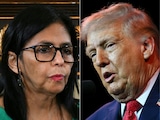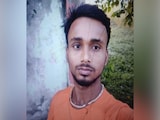The Taliban announced their government on Tuesday, with a UN-blacklisted veteran of the hardline movement in the top role, weeks after they swept to power and toppled the US-backed president.
But as the Taliban transitions from terrorist force to governing power of Afghanistan, security officials grappled with a growing number of protests against its rule, with two people shot dead in the western city of Herat.
Mullah Mohammad Hassan Akhund -- a senior minister during the Taliban's brutal and repressive reign in the 1990s -- was appointed acting prime minister, a spokesman said at a press conference in Kabul.
Prime Minister Nawaz Sharif with Mullah Mohammad Hassan Akhund (R) in Islamabad.
The Taliban had promised an inclusive government that would reflect the ethnic makeup of the country, but all the top positions were handed to key leaders from the movement and the Haqqani network -- the most violent branch of the Taliban known for devastating attacks.
None of the government appointees were women.
"We will try to take people from other parts of the country," spokesman Zabiullah Mujahid said, adding that it was an interim government.
Shortly after the new lineup was revealed, Hibatullah Akhundzada, the secretive supreme leader of the Taliban who has never been seen in public, released a statement saying that the new government would "work hard towards upholding Islamic rules and sharia law".
"The new Taliban, same as the old Taliban," tweeted Bill Roggio, managing editor of the US-based Long War Journal.
Mullah Yaqoob, the son of the Taliban founder and late supreme leader Mullah Omar, was named defence minister, while the position of interior minister was given to Sirajuddin Haqqani, the leader of the Haqqani network.
Taliban co-founder Abdul Ghani Baradar, who oversaw the signing of the US withdrawal agreement, will be a deputy to Hassan.
"It's not at all inclusive, and that's no surprise whatsoever," said Michael Kugelman, a South Asia expert at the Woodrow Wilson International Center for Scholars.
"The Taliban had never indicated that any of its cabinet ministers would include anyone other than themselves."
'No rush' to recognize Taliban
Following their 20-year insurgency, the Taliban now face the colossal task of ruling Afghanistan, which is wracked with economic problems and security challenges -- including from the Islamic State group's local chapter.
A growing number of protests have emerged across the country over the past week, with many Afghans fearful of a repeat of the Taliban's previous brutal and oppressive reign.
Hundreds gathered at several rallies in Kabul on Tuesday -- a show of defiance unthinkable under the last regime -- where Taliban guards fired shots to disperse the crowds.
In Herat, hundreds of demonstrators marched, unfurling banners and waving the Afghan flag -- a black, red and green vertical tricolour with the national emblem overlaid in white -- with some chanting "freedom".
Later, two bodies were brought to the city's central hospital from the site of the protest, a doctor in Herat told AFP on condition of anonymity for fear of reprisals.
Afghanistan: A large number of protests have emerged across the country over the past week
"They all have bullet wounds," he said.
Demonstrations have also been held in smaller cities in recent days, where women have demanded to be part of a new government.
The Kabul-based Afghan Independent Journalists Association said 14 journalists -- Afghan and foreign -- were detained briefly during the protests in Kabul before being released.
The Taliban spokesman late Tuesday warned the public against taking to the streets.
"Until all the government offices have opened, and the laws for protests have been explained, no one should protest," Mujahid said.
The group -- which executed people in stadiums and chopped the hands of thieves in the 1990s -- has previously said it would not stand for any resistance against its rule.
Washington, which has said it is in "no rush" to recognise the new government, expressed concern Tuesday about members of the government but said it would judge it by its actions.
"We note the announced list of names consists exclusively of individuals who are members of the Taliban or their close associates and no women. We also are concerned by the affiliations and track records of some of the individuals," a State Department spokesperson said.
"We understand that the Taliban has presented this as a caretaker cabinet. However, we will judge the Taliban by its actions, not words."
US Secretary of State Antony Blinken, on a visit to Qatar, said that the Taliban were honouring promises to allow Afghans to freely depart Afghanistan so long as they had travel documents.
US President Joe Biden has faced mounting pressure amid reports that several hundred people, including Americans, have been prevented for a week from flying out of an airport in northern Afghanistan.
No women in government
At the United Nations, Pramila Patten -- head of UN Women, a group that promotes global gender equality -- said the absence of women in the interim Afghan government "calls into question the recent commitments to protect and respect the rights of Afghanistan's women and girls."
By excluding women, "the Taliban leadership has sent the wrong signal about their stated goal of building an inclusive, strong and prosperous society."
She described respect for women's rights as "a litmus test against which any authority must be judged," and called on the Taliban to "fully comply with its legally binding obligations" under international treaties and the constitution that guarantee "the full participation of women in political and decision-making processes."
(Except for the headline, this story has not been edited by NDTV staff and is published from a syndicated feed.)















